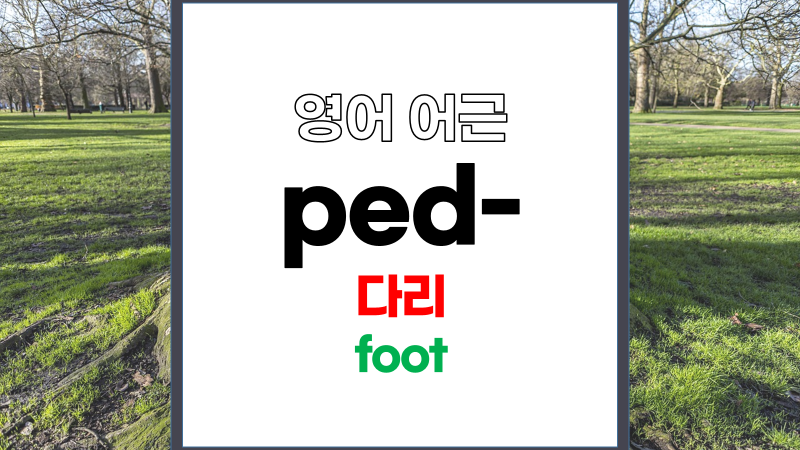
영어 어근 ped는 라틴어(Latin) pes, pedis에서 유래했습니다.
'다리', 'foot', '발을 가진 (생물)'(이)라는 기본적인 의미를 갖고 있습니다.
[어근]어근 ped
[변이어근] ped, pede, peach, pedi, pedestr, pion
[어원]어근 (라틴어) pes, pedis
[의미]어근 다리, foot, 발을 가진 (생물)
[어근 상세 내역]
- [Latin] pes - [from PIE root *ped-] 〈genitive pedis〉 foot (발)
- [Latin] pedis - [genitive of pes] (of) foot; fetter, chain for the feet (발(의))
[주요 어휘 목록] centipede, expedite, expedition, ped, pedestrian, pioneer
[암기 기준] ★★★★(기본암기: 상위 2,050이내) ★★★(필수암기: 상위 3,265이내) ★★(권장암기: 상위 4,467이내) ☆(추천암기: 상위 7,084이내)
【영어단어어휘별 상세 정보】
centipede noun[10000+] [레마] centipede 〈 cent
[영영] A centipede is a long, thin creature with a lot of legs.
[영한] 지네
[어근] ⑴ centi(cent); 백(100), 100분의 1 ⑵ pede(ped); 다리
[어원] 《라틴어 centipeda》 [from centum("hundred")+pedis("foot")] many-footed arthropod
[최초 의미] venomous, many-legged, insect-sized arthropod
[파생] centipedal, centipede
expedite verb[10000+] [레마] expedite 〈 ped
[영한] 더 신속히 처리하다
[유의어] speed up
[어근] ⑴ ex; 밖으로 ⑵ ped; 다리, foot ⑶ ite; 명사/형용사/동사
[어원] 《라틴어 expedire》 [ex+*pedis] make ready, prepare, extricate, disengage, liberate; procure, make ready, put in order, make fit, prepare; explain, make clear; (literally) free the feet from fetters
[최초 의미] to remove impediments to the movement or progress of, accelerate the motion or progress of, hasten, quicken,
[파생] expediter, expedite
expedition noun ★★★[3181] [레마] expedite 〈 ped
[영영] ① a journey especially by a group of people for a specific purpose (such as to explore a distant place or to do research)
② also used in a playful way to refer to a short trip for a specific purpose
③ a group of people who travel together to a distant place; a group of people who go on an expedition
[영한] ① 탐험, 원정 ② 탐험[원정]대 ③ (때로 유머) (필요한 일을 하기 위한 짧은) 여행
[굴절형] 복수형; expeditions
[구성단어] expedite + ion
[어근] ⑴ ex; 밖으로 ⑵ ped; 다리, foot ⑶ it(ite); 명사/형용사/동사 ⑷ ion; 명사 어미
[어원] 《라틴어 expeditio》 [nominative of expeditionem] an enterprise against an enemy, a military campaign
[최초 의미] military campaign; the act of rapidly setting forth,
ped comb.[10000+] [레마] ped
[영한] 발
[어근] ped; 다리, foot
[어원] 《라틴어 pedis》 발(의)
pedestrian noun[8669] [레마] pedestrian
[영영] A pedestrian is a person who is walking, especially in a town or city, rather than travelling in a vehicle.
[영한] ① 보행자 ② 보행자(walker), 도보 여행자 ③ 잘 걷는 사람, 도보 경주자, 도보주의자
[굴절형] 복수형; pedestrians
<형용사> ① 보행자용의, 보행자의 ② 상상력이 없는, 재미없는
[어근] ⑴ pedestr(ped); 다리, foot ⑵ ian(an); …의 (사람)
[어원] 《라틴어 pedester》 [genitive pedestris] plain, not versified, prosaic; on foot
[파생] pedestrianism, pedestrian
pioneer noun ★★★[2898] [레마] pioneer 〈 ped
[영영] Someone who is referred to as a pioneer in a particular area of activity is one of the first people to be involved in it and develop it.
[영한] ① (특정 지식문화 부문의) 개척자[선구자] ② (거친 땅을 일구는) 개척자
[굴절형] 복수형; pioneers
[유의어] trailblazer
<동사> 개척하다
[어근] ⑴ pion(ped); 다리, foot ⑵ eer; 명사 어미
[어원] 《프랑스말 paon》 【from Latin pedo[=from Latin pes(‘foot’)]】 foot soldier
[최초 의미] one of a party or company of foot soldiers furnished with digging and cutting equipment who prepare the way for the army
[그외 ped이(가) 들어가 있는 어휘 목록] impede, expedient, impeach, impediment, pedal, peddler, quadruped, expeditious, peonage, pedicure, expediency, piedmont, centipedal, biped, bipedal, decempedal, expeditate, expeditionary, impeachable, Impeachment, impedition, impeditive, inexpedient, interpetiolar, intrapetiolar, millipede, multiped, multipede, octopede, oppidum, pawn, pedate, pedatifid, pedestal, pedicel, pedicle, pediform, pedigerous, pedigree, peduncle, pedunculate, peon, petiolar, petiolate, petiole, petiolular, petiolulate, petiolule, piedfort, quadrupedal, repedation, semiped, semipedal, sesquipedal, stapes, stapedius, subpetiolate, suppedaneum, tripedal, trivet, velocipede, expediter, vampish, vamper
【다른 어근 보기】
phob-, -phobia
phan-, phen-, phase-
petr-, petro-
pauc, poor-
patr-
path
pare
ed-, es-, eder-
edit
par
영어 단어의 상당부분은 그리스어, 라틴어, 프랑스에서 유래되었습니다. 이들이 영어로 유입되는 과정에서 다른 단어와 결합되고, 분화되면서 아주 많은 가족 단어들을 만들어 내었습니다. 따라서 이들 어근을 연구하면 상대적으로 영어단어를 쉽게 익힐 수 있습니다.
영어단어 어근은 크게 접두어, 연결어(어근) 그리고 접미어 등 세 그룹으로 나눌 수 있습니다.
(end) 





